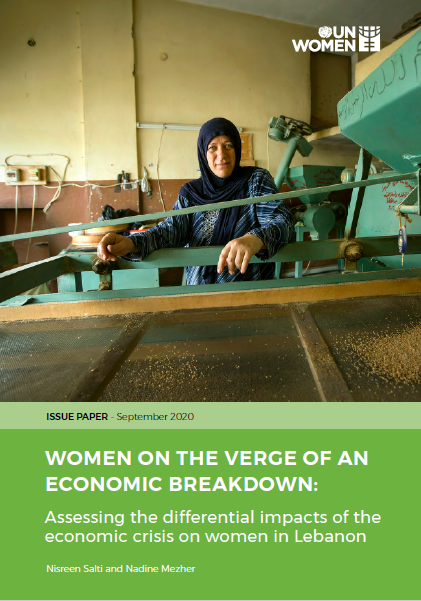
Women on the Verge of an Economic Breakdown: Addressing the differential impacts of the economic crisis on women in Lebanon

The scale of the crisis in Lebanon is monumental. While it is currently trying to curb the spread of the worldwide COVID-19 pandemic, which began in early 2020, and contending with the devastating impacts of an explosion in Beirut on 4 August 2020, it was already mired in an unprecedented economic crisis. It is estimated that more than half (55 percent) of the population was living below the poverty line by May 2020, a rise from 28 percent in 2019.
Women were at a substantial disadvantage even before the economic downturn, therefore more vulnerable to the devastating effects of the economic crisis. Consequently, as the country falls deeper into an economic, banking and fiscal crises, it is expected that Lebanon will endure painful losses that will not fall equally on everyone.
This paper assesses, estimates and analyses the expected impact of the economic crisis on women, looking specifically at issues of job loss and unemployment.
Based on analysis undertaken by the authors, a 25 percent contraction in real GDP from 2017 to 2020 is expected to have increased women’s unemployment rate from 14.3 percent before the crisis to 26 percent by September 2020. This translates to a 63 percent increase—from 81,200 to 132,500—in the number of women in unemployment—or 51,300 more women in unemployment in June 2020 as compared to 2018/2019.
A conservative estimate of the resulting female exit from the labour force—that is women who are no longer looking for jobs—is expected to be almost 40,000-strong by October 2020. By extension, the number of employed women can be expected to drop by 22 percent.
However, the combined effects of predicted job loss, with rising economic inactivity by some women (i.e. those who exit the labour market) imply that the number of women not working (as a proportion of the total female population of the country) has risen by 106,750. This represents the number of women who were once working but are no longer doing so because they have either lost their jobs or exited the labour market altogether.